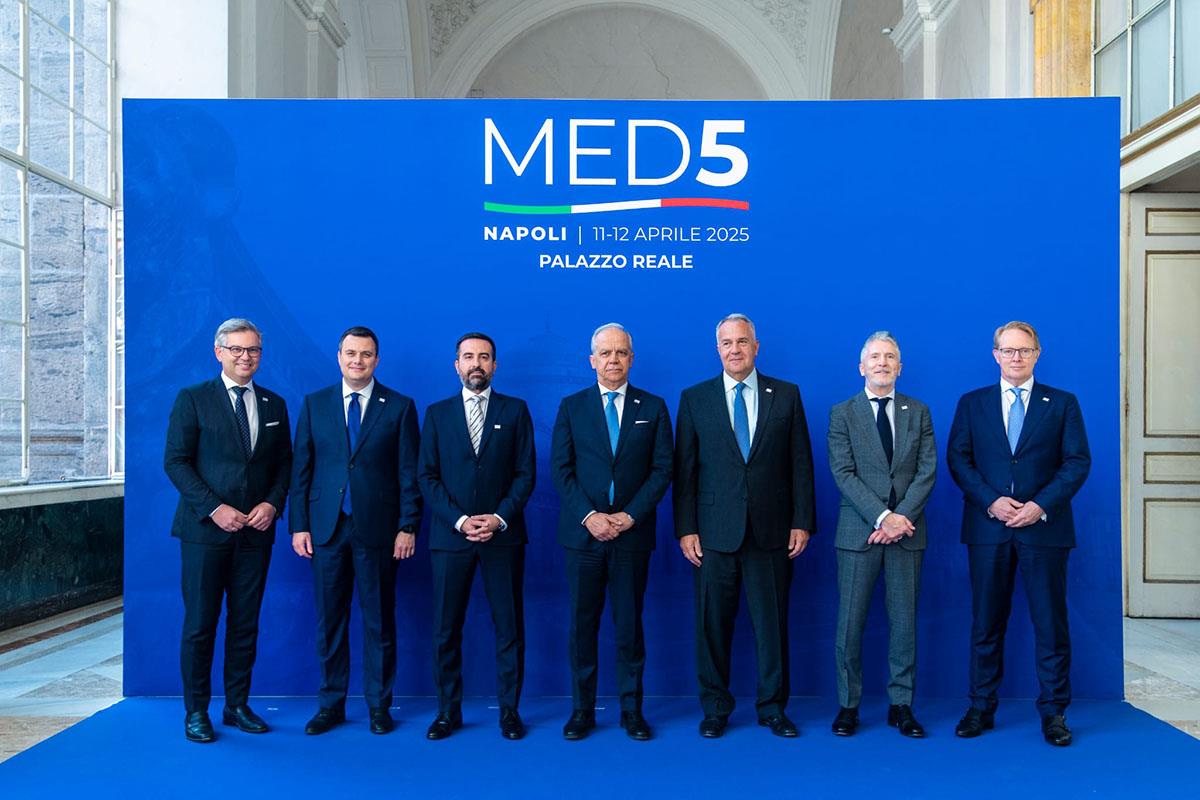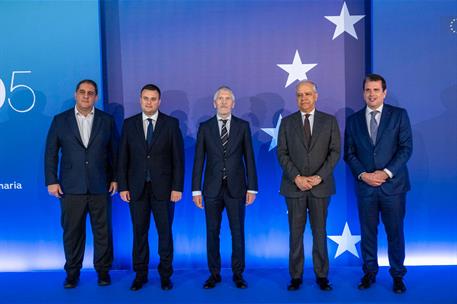 Group photo of the members of MED5
Group photo of the members of MED5
The Minister for Home Affairs, Fernando Grande-Marlaska, agreed with his counterparts at MED5 - the summit that brings together the heads of Home Affairs and Migration ministries of Spain, Italy, Greece, Malta and Cyprus - on the need to go to Europe "as a single group" to demand improved funding for migration prevention. "This common position will be beneficial for the other Member States and for the EU as a whole. If arrivals to the EU start with us, European funding must also start with us," the minister stressed in Naples.
"Beyond innovative solutions, effective collaboration with the source and transit countries is key in fighting human trafficking," the minister said during his speech at the eighth MED5 summit in Naples (Italy). "This collaboration is complex and requires a lot of daily effort, but it is essential to improve the return, based on mutual trust and respect," he remarked.
In addition to Grande-Marlaska, the meeting was attended by the Italian Minister Home Affairs, Matteo Piantedosi; the Greek Minister for Migration and Asylum, Nikolaos Panagiotopoulos; the Maltese Minister for Security and Employment, Byron Camilleri; and the Deputy Minister for Migration and International Protection of Cyprus, Nicholas A. Ioannides. The European Commissioner for Home Affairs and Migration, Magnus Brunner, and the Executive Director of Frontex, Hans Leijtens, also took part.
The Spanish Home Affairs Minister has advocated continuing to work within the framework of MED5 so that the five Mediterranean countries can take a common proposal to Europe that is "acceptable to all" on the future regulation of return. "Although we start from different positions, we must work on what unites us and not on what separates us," he said.
Grande-Marlaska insisted on the need to "maintain the unity" of the MED5 to ensure that the implementation of the Migration and Asylum Pact respects the balance between the responsibility of the countries of first entry of migration and the obligations of solidarity for all EU countries, "a balance that was possible to achieve thanks, to a large extent, to the solidity of the common position taken to Brussels by the Mediterranean countries during the last years of negotiation," he recalled.
Cooperation and reform of the Frontex regulation
The meeting in Naples devoted a specific round table to discussing the European Union's external action on migration policy through cooperation with third countries and the European Border and Coast Guard Agency (Frontex). In this regard, Grande-Marlaska has called for "as soon as possible" reinforcing the financing of projects abroad and extending the European Commission's funds earmarked for border management.
The MED5 countries also agreed on the importance of strengthening the role of EU agencies in cooperation with third countries in migration matters and urged the reform of the Frontex regulation in this direction, so that the agency can strengthen ties with the countries of North Africa and West Africa, "which are key to migration prevention and regional stability," said the minister.
MED5 Joint Statement
The MED5 adopted a joint statement reaffirming the commitment of the five countries to the effective implementation of the European Migration and Asylum Pact and calling for "immediate unconditional funding" and a "reinforced allocation" for border Member States, "bearing in mind that it is they who manage the external borders for the benefit of the whole EU".
The text urges the EU to "develop ambitious and lasting global partnerships" with third countries, "in consultation with the member states most concerned, such as the MED5 countries", and in that vein encourages the initiation of new partnerships with key source and transit countries in Africa, Asia and the Middle East, "which play a strategic role in the region and whose stability is vital to the EU's interests".
Mediterranean countries underline the "vital" importance of an "effective" return policy for the proper functioning of the asylum system and call for a stronger Frontex presence in preventing irregular migration and supporting returns, "not only from Member States, but also from third countries".
The statement proposes promoting assisted voluntary returns, "with an adequate level of funding", and calls on the European Commission to organise an international conference, in the framework of the Global Alliance against Migrant Smuggling, to address specific initiatives on assisted voluntary return.
Non official translation





